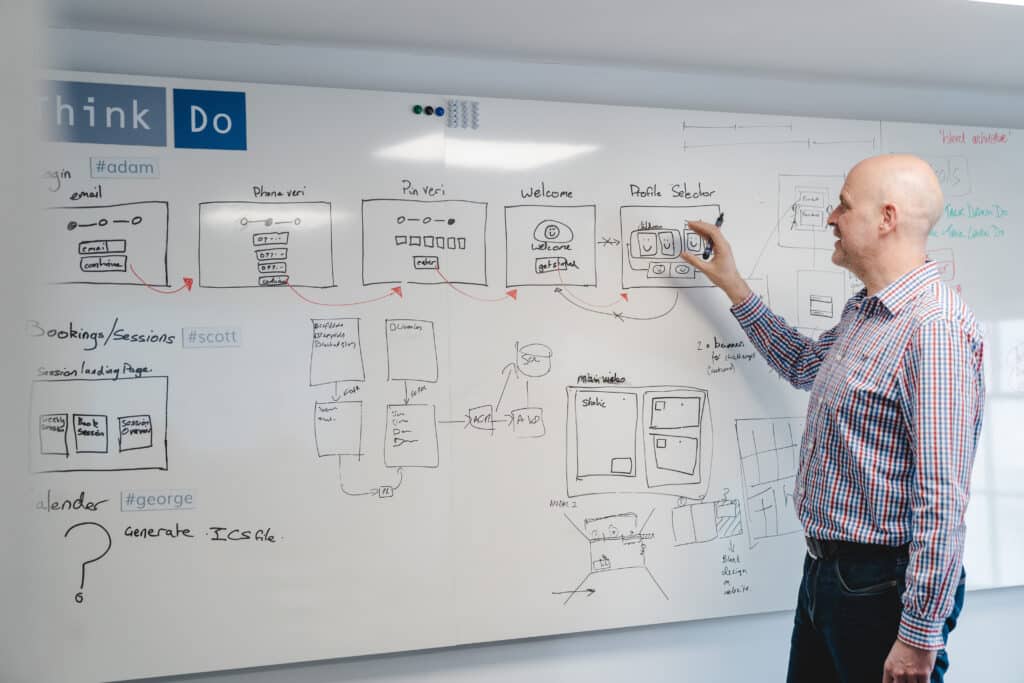What is the Future of Cloud Security?

Cloud adoption continues to increase at breakneck speed, with more and more businesses choosing to future-proof their technology and processes by migrating to cloud-native technologies. By 2025, it is estimated that the amount of data stored across public, private, and government clouds will reach 100 zettabytes — or roughly half of the world’s data.1
As our reliance on cloud storage becomes greater, so will the risk of cloud data breaches. In 2021, 39% of businesses dealt with a cybersecurity breach,2 and that number looks set to go up, with damages predicted to total $10.5 trillion by 2025.3 For context, that’s about four times the UK’s GDP.
To meet this growing threat, cloud security is constantly being updated and modernised. By implementing a robust cloud security strategy, you can achieve your operational goals, while also allowing you to:
- Improve application stability.
- Reduce downtime and improve business continuity.
- Scale your applications with ease.
All of this makes cloud security a sound investment. By paying out in the short term, you protect your data — and by extension your business — in the long run. In this article, we’ll take a detailed look at the future of cloud security, and explain how leading cloud providers are rising to the challenge of data breaches.
Suggested reading: Modern cloud security is the first step to modernising your legacy systems. We talk more about them and their drawbacks in our eBook, Legacy Systems Are Costing Your Business Growth.

Data privacy
As you know, there are already regulations such as GDPR and the Data Protection Act 2018 that set out the requirements businesses of all sizes must adhere to in order to store data safely and ethically.
To meet these guidelines, businesses need a deep understanding of encryption, including overhead, key management, and how data is stored within a layered cloud model if they want to ensure the smooth operations of their business.
The problem is, these are highly specialised issues. Most organisations don’t have that level of granular expertise among their ranks. Without the right technical know-how, it can be extremely difficult for most businesses to run and maintain cloud-native applications in a data-secure way, especially for applications that are constantly upgrading and scaling. This poses a major threat to businesses, as it only takes one data breach to tarnish the finances — and reputation — of an entire organisation.
It’s also becoming harder to keep up with data privacy, as the UK government aims to push through the Data Protection and Digital Information Bill that’s meant to loosen some of the data privacy restrictions businesses follow.4 Updating applications to fit these new restrictions puts a lot of strain on internal teams and pulls them away from important tasks such as providing the best possible services to your customers.
Unsurprisingly, an increasing number of businesses are outsourcing their cloud application development to third parties who have the expertise to build, run, and maintain their applications effectively. By partnering with a cloud technology expert, your business can:
- Leverage cloud expertise without having to invest in recruitment or training.
- Benefit from scalable, adaptable applications that help the organisation achieve its strategic goals.
- Modernise cloud-based applications in line with changing regulatory standards.
- Reduce the risk of data breaches while freeing up internal teams to focus on business-critical tasks.
By choosing the right public cloud provider, businesses can further safeguard their data. For example, applications built on Microsoft Azure can utilise the Microsoft cloud security benchmark (MCSB), providing them with a score that outlines how compliant they are with data and security regulations.
Suggested reading: We get into more detail about the benefits of Microsoft Azure in our blog, Why Microsoft Cloud Native Applications Take Businesses Forward.
Borderless security
While the move towards borderless security started several years ago, this trend really accelerated with the widespread shift towards hybrid and remote work. The traditional method of securing a perimeter around your network and data makes less sense in a world where businesses operate globally and remotely. Today, people need seamless access to data wherever they are.
That said, there still needs to be a security framework for this new paradigm, complete with centralised monitoring. Global businesses have a larger surface area for their data — and, as a result, there is an increased risk of data breaches. Unsurprisingly, there was a 140% increase in the number of data records compromised as a result of cyberattacks during the pandemic.5
Many businesses mitigate this risk by utilising zero-trust architecture (ZTA), benefitting from access only being granted on a case-by-case basis and reducing the risk of unauthorised access to data.
Microsoft Azure leads the way when it comes to zero-trust network access, ensuring that your data remains secure no matter how geographically dispersed your organisation is. Nevertheless, implementing an architecture like this in a cost-effective, efficient, and scalable way — without incurring technical debt — is a huge challenge for most organisations.
This is why it pays to outsource cloud security to a trusted third party. Partnering with a technology expert enables your business to:
- Solve any issues that arise in the implementation of borderless security architecture.
- Gain access to expertise and experience that may not exist in-house.
- Deliver services in a time-efficient, cost-effective manner.
- Improve the flow of data on a global scale, without putting additional stress on internal teams.
- Establish data security frameworks that scale as your business grows.
Cloud-native tools and platforms
While many organisations have made the shift to cloud-native applications as part of a global digital transformation, they haven’t updated their security accordingly, continuing to use tools and platforms designed for traditional on-premise apps.
For smaller organisations with relatively simple IT needs, on-premise or hybrid cloud security isn’t a bad choice thanks to its customisable, cost-efficient nature. However, when looking at the future of cloud security it has to reflect what the future of work is for most businesses: global, hybrid teams.
Serverless architectures keep your data secure in this case, greatly diminishing the risk of data breaches through phishing and other email-related threats. This helps to protect your bottom line, while also making your applications and workflows more efficient.
Ultimately, if you want your architecture to scale as your business grows, you should invest in cloud-native security tools that are capable of withstanding a global data breach.
Public cloud services — such as Microsoft Azure — offer robust security capabilities that are improving all the time. Microsoft Azure Defender, for example, offers a myriad of cloud-native security features, including the ability to automatically classify data in Azure SQL and secure access policies on selected ports, granting access only to authorised users for a limited time.
To maximise ROI on your cloud computing technologies, it pays to work with an expert partner. Talk Think Do can play a part in your cloud security by:
- Building cloud-native applications that solve the challenges of legacy security systems, making them more secure, more efficient, and easier to use.
- Fewer breaches mean that applications remain stable, with very little downtime.
- Acting as an integral partner to ensure the continued success of the applications through 24/7 Managed Application Support (and by way of functionality, security, and scalability, ensuring the application continues to meet business needs over time).
Microsoft Azure — the future of cloud security
As we move further towards a cloud-native future, cloud security will continue to change and adapt to new threat landscapes. For businesses looking to build in the cloud, the best bet is to choose public cloud providers that are always one step ahead of the game — and Microsoft Azure is a prime example.
Microsoft Azure’s cloud security is second to none, offering cloud security posture management and cloud workload protection platform capabilities, so that your cloud data is protected at all times.
To make the most of these powerful capabilities, however, it pays to work with an expert like Talk Think Do. We’re a Microsoft Solutions Partner (a recent promotion from our Microsoft Gold status), and we can work closely with you to build custom, scalable applications on the Azure framework.6 So you’ll get all the benefits of bespoke applications, with all the extensive security that comes with Azure.
If you’d like to find out more about how Talk Think Do can transform the way your business operates through cloud technologies, get in touch today and book a free consultation.

1 Top 10 Cybersecurity Predictions and Statistics for 2023.
2 Cyber Security Breaches Survey 2021.
3 Top 10 Cybersecurity Predictions and Statistics for 2023.
4 Data Protection and Digital Information Bill | UK Parliament
5 Borderless Security — Enabling Anywhere, Anytime, and Any Device Security.
6 Introduction to Solutions partner designations | Microsoft
Get access to our monthly
roundup of news and insights
You can unsubscribe from these communications at any time. For more information on how to unsubscribe, our privacy practices, and how we are committed to protecting and respecting your privacy, please review our Privacy Policy.
See our Latest Insights
Shipping AI in the Real World: Lessons From Our Latest Cycle
AI moves pretty fast. If you don't stop and look around once in a while, you could miss it. Recognising this, we have been running a structured approach to AI adoption for production systems. A critical element is ensuring we keep up with the latest approaches while retaining safety, responsibility and avoiding inefficiencies cause by...
Working as One Team: How Our Business Analysts Bridge Vision and Delivery
When clients partner with us, they often expect engineers and designers. But one of the most powerful roles behind a successful digital product is often less visible: the Business Analyst (BA). At Talk Think Do, BAs aren’t just requirement-gatherers. We’re connectors, between vision and execution, users and features, partners and platforms. In the recent delivery…
Implementing RAG AI Search on On-Premise Files with our AI Search Accelerator
As demand for AI‑powered tools like Microsoft Copilot grows, many organisations are asking the same question: “How can we harness the power of generative AI without moving our sensitive data to the cloud?” In this guide, we’ll explain why Retrieval‑Augmented Generation (RAG) is so effective for on‑premise data and walk through a practical approach using…
Legacy systems are costing your business growth.
Get your free guide to adopting cloud software to drive business growth.




